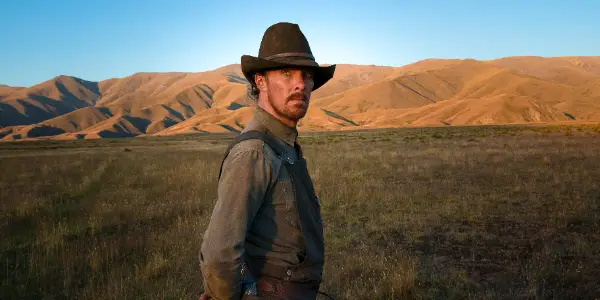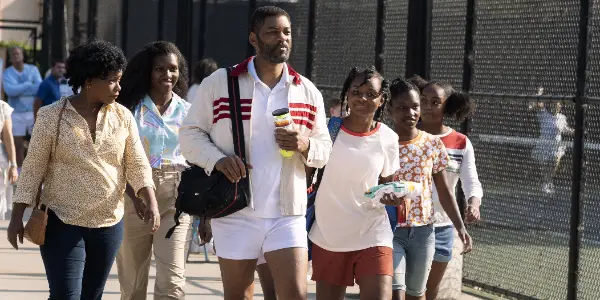HIFF Report 3: THE POWER OF THE DOG, KING RICHARD, POSER & ALIEN ON STAGE

Alex is a film addict, TV aficionado, and book lover.…
The 30th Heartland International Film Festival has sadly come to an end, but I’ve got one last report covering some of the big names and small gems that showed at the festival.
The Power of the Dog (Jane Campion)

A return to cinema by one of the most acclaimed filmmakers of all time will always be worth celebrating, but one must be careful not to praise the thing simply for existing.
Jane Campion, the second woman to be nominated for a Best Director Oscar and until this year the only female Palme d’Or winner, hadn’t released a feature since 2009’s Bright Star, so naturally people were clamoring for the evocative lens she puts on the world. When it was announced that she was returning with a star-studded take on the American West, people basically began salivating.
And why not? Even if you weren’t familiar with the 1967 novel of the same name on which this is based, it was clear this would be a tale of isolation and cruelty with something unexpected coming from the coldly observant ranch owner, Phil, played by Benedict Cumberbatch. The kicking-off point would be the introduction of his brother’s new wife, who brings along her son from a previous marriage, and from there parallels to The Piano seemed stark (a piano even turns up early in the film, which elicited a chuckle from me).
Once you sit down with the film, though, it becomes clear that the marketing and carefully worded writeups about this film obscures a pretty key plot point. I’m not precisely sure why; as I said, it’s based on an existing book, and the true nature of the story is clear long before Campion chooses to spell it out (at least it was to me). I’ll stick with the trend, though, so suffice it to say that no one on this ranch is happy, each circling a nightmarish vortex that drags each into their own personal hellhole.
It would be easy to say the vortex is Phil, who stomps around like he has everyone sorted out and can choose to stab the most fragile part of your ego whenever he wants. He leads the ranch hands through unquestioned adoration and keeps his brother, George (a perfectly cast Jesse Plemons), suffocated in his shadow. When George tries to break free by bringing home a wife he is moved to tears, his small grab at the life he wants so shattering that he can’t contain himself. This only prompts Phil to exert control even more cruelly, but it becomes clear that his cruelty is another symptom of the vortex they all long to escape.
The setup sounds like a film Campion would tear into until its beating heart was revealed, and one that would give its top-notch cast, which also includes Kirsten Dunst, Kodi Smit-McPhee, Thomasin McKenzie, Keith Carradine, and Frances Conroy, plenty to play with. Instead, in the film’s biggest shock, it’s all very staid and straightforward, an elegantly staged skim over the surface of an all too familiar story.
What makes one story about longing heartbreaking and another inert? Does it come down to the spark of the actors, their mysterious ability to get across layers of desire and repression either popping off the screen or not? Is it the construction of characters that, however, buried, have some flicker of hope within them? Or does doom work, the inevitability of their destruction its own bitter drink we’ve all tasted?
The reality is that any approach works, and there’s fickle magic in how the entirety of a movie comes together to touch your soul. Not even shifting cultural mores can sink one that, at heart, nails the simple truths. 1945’s Brief Encounter is about a besotted couple who can’t be together because they’re married to other people. In today’s world this is far from an insurmountable obstacle, and yet the film remains one of the greatest doomed romances of all time, carried by the intensity of emotion it captures.
The Power of the Dog, for all its pretty posturing, keeps its characters at arm’s length, rattling off emotions instead of feeling them deeply. Even the most repressed people have deep wells, and one of the beauties of film is that it can illuminate things its characters dare not unpack themselves. There’s a lot to unpack in the miserable people who populate this dusty ranch, but Campion fails to get past their surface-level fears and desires, leaving their soul-rattling truths untouched.
King Richard (Reinaldo Marcus Green)

Everything you’re already thinking about for the nearly two and half-hour-long biopic on the father of Venus and Serena Williams is probably correct. Yes, it is a strange choice to focus on the man who guided them and not the women who actually did the work. Yes, it is a feel-good puff piece (Venus and Serena are executive producers, so they wouldn’t let things get too harsh). And yes, it is too long. But you know what? None of that really matters because the story is too good not to be sucked in.
The movie assumes you’re aware that the Williams sisters are two of the greatest tennis players of all time, so it doesn’t waste time on the story you already know. Instead, it takes you back to their childhood, where their father, Richard, kept them on a rigorous training schedule and clawed to get them the coaching they needed. After all, no one was rolling out the red carpet for two Black girls from Compton, so his much whispered about (okay, loudly talked about) method of simultaneously hyping and protecting his daughters was probably necessary for them to survive.
The film portrays this hustle in the rosiest of lights, mostly playing it as an inspirational story of overcoming obstacles, often mixing in humor, and occasionally letting the more uncomfortable stuff come through. The latter can’t be entirely left out, because after all, this is a man who navigated a deeply racist sport within a deeply racist society, there are wounds that come from that.
Much will be made of the turn by Will Smith in the title role, who dips into the stiff mannerisms of Richard but still remains, very much, Will Smith. That’s not a bad thing; the movie thrives on his star power, and he’s more than capable of handling the film’s darker moments. Still, this is far from a revelatory role, and it’s unlikely to get him to the grand awards stages he’s eyeing.
No, the film is a tad too unfocused for that, struggling at times to keep its title character-centered as the sisters grow up. Once they get their foot in the door of the tennis world, its many characters rise to the surface, and name drops/brief appearances by the likes of John McEnroe (who does yell), Jennifer Capriati, and the influx of Russian players adds bloat to the story. Tennis fans like myself will enjoy the thrill of reminiscing about players long retired and luxuriating in the ‘80s and ‘90s fashions (the tennis world they create, including the on-court action, passes muster), but most of it is unnecessary worldbuilding, to be honest.
The more pertinent details, like the coded and overt racism they face, gets softened by the feel-good lens. I mean, no one in my theater cheered when Venus stepped onto the court with beads in her hair, but I wanted to. Those beads were an early signature of the sisters and one of many outfit battles tennis as a whole waged against them in barely-veiled policing of Black women in a white sport. Because I remember them as an important signifier of the change the sisters brought, it’s a shame the moment passes without being fully explained.
What does come across in moments like that is that it was Venus, not Serena, who broke down many of the early barriers. It’s no secret that Serena became the more successful player and bigger star, so it’s nice to see the weight Venus carried get the recognition it deserves. In fact, much of the latter part of the movie turns its attention to Venus, with Serena and Richard relegated to being a yearning younger sister and the dad learning to take the wishes of his teenage daughter into consideration. This is technically a break from the film’s focus as well, but it’s a welcome shift towards the true stars we’re here to cheer for, which lets the film end on a triumphant note.
Poser (Noah Dixon and Ori Segev)

Cinema has a long history of playing with identity, which Poser knowingly pulls from and updates for the podcast world, but it’s far from a poser itself. Sure, its hallmarks are clear and you always sort of know where it’s going, but the old ‘worshiper gets dangerously close to the worshipee’ story is done with such aplomb that it’s easy to get sucked into it despite the familiarity.
Don’t stop me if you’ve heard this one before. Lennon is an awkward outsider who idolizes members of her city’s underground music scene. She starts up a podcast as an excuse to talk to the bands she sees onstage, getting particularly close to one frontwoman who oozes confidence and swagger. The friendship is based on a lie, though, as no one is actually listening to Lennon’s podcast, and she resorts to desperate measures to keep ahold of the attention she’s receiving.
Directors Noah Dixon and Ori Segev (Dixon also wrote the script) mete out their story precisely, starting things off with a few silent alarms about Lennon’s frustratingly empty life and building these warnings into palpable dread. You know that Lennon won’t accept losing her new friends, but you also know that her web of lies aren’t sustainable. She’s a ticking time bomb in this insular world, but until she goes off, Dixon and Segev aren’t afraid to lighten the mood.
There are several humorous montages cataloguing the acts Lennon encounters and the oddities of their culture, from a man who never takes off a wolf mask to a band who describes their music as queer death pop (which felt like having the musical taste of my mid-20s called out). Asides like this make the world feel vividly alive, and their oddball but very realistic details make it no surprise that they come from the real local music scene in Columbus, Ohio where Dixon and Segev have worked with bands for years.
In fact, one-half of the tenuous central relationship is a real-life musician. The magnetic Bobbi Kitten plays a fictional version of herself (but keeps the great name), and it’s easy to see why Lennon would key in on her. She commands the stage and the screen as well, either due to her familiarity with the role or some raw, untapped acting talent. Granted, she’s mostly asked to bob along as a hook Lennon is always chasing, but you understand the appeal.
Meanwhile, Sylvie Mix also makes her feature debut as the lurking Lennon, and her turn as someone we are asked to both empathize with and be wary of is pitch-perfect. Mix plays her with a subtle chill, never hitting her awkwardness or her moments of real evil too hard. Like everything else in this film, she feels like someone you might find in the back of one of these dingy clubs or the bogeyman the community whispers about as their parties wind down. And that’s the beauty of Poser: part of it feels real while another part feels ripped straight from thrillers we know and love, and the way these are woven together makes for a beautifully chilling movie.
Alien on Stage (Lucy Harvey and Danielle Kummer)

If there’s one thing we all share it’s a giddy love of movies, which is exactly what powers the documentary Alien On Stage. The film follows a group of employees from a bus company in Dorset, England who put on a pantomime for charity every year. These are traditionally small affairs done for the fun of it, until one year the aspiring screenwriter of the group decides to up the ante. He comes up with a stage adaptation of the 1979 horror/science fiction classic Alien, and inexplicably the group decides to stage the elaborate production. Rickety sets are built, fishing line and PVC pipe create some truly special effects, and relatively complicated lighting and smoke effects are planned, all while actors half memorize their lines. The end result is exactly as ludicrous as it sounds but in the most glorious way possible.
Directors Lucy Harvey and Danielle Kummer know exactly how to capture the rambunctious energy the cast and crew bring to the table, which will be familiar to anyone who’s ever been involved in school or local productions. There’s squabbling, sure, but all the time and energy being devoted is done purely for the love of the game, which you see through the sly smiles that break out while each person describes their role. I mean, who wouldn’t chuckle about devoting hours of time to making an alien tail that wiggles clunkily?
This focus on the people outside the onstage performers makes sure you appreciate the production as a whole, and while the entire cast of characters here are winners, particular attention must be given to the ex-military man who directs the play. Others dance around how he’s an unlikely choice to lead an artistic production, but as the rest of the group indulges their disparate and often unhelpful reasons for being there and issues with practice scheduling, truck maneuvering, and overall focus pile up, you get the sense that he’s the only one who could possibly hold this together. A nice motif Harvey and Kummer include is his smoke breaks, which escalate from being referenced to being glimpsed to being held on as the production inexplicably takes off and his stress level exponentially increases.
Despite lackluster local showings, the oddness of the idea eventually lands them a one-night showing on West End, where curiosity seekers sell out the theater. Much of the film focuses on this night, where the people we’ve come to know and love, puke and giggle, their way through an experience they never imagined having.
The way the lead-up charms you on every level lets you know that the night will be a success, and seeing the audience take it in with exactly the right spirit, applauding the sheer audacity of a micro-budget chestburster scene with awkward blocking and flubbed lines, confirms that Harvey and Kummer capture the very real, very mind-boggling experience of an Alien stage production. Most of us will never see anything like it, and if the sheer joy of this documentary is any indication, then that’s a shame.
That’s the last of three reports from HIFF. Which film are you looking forward to seeing? Let us know in the comments!
Does content like this matter to you?
Become a Member and support film journalism. Unlock access to all of Film Inquiry`s great articles. Join a community of like-minded readers who are passionate about cinema - get access to our private members Network, give back to independent filmmakers, and more.
Alex is a film addict, TV aficionado, and book lover. He's perfecting his cat dad energy.













